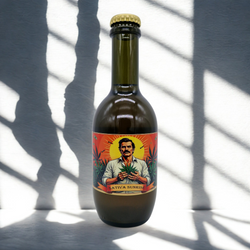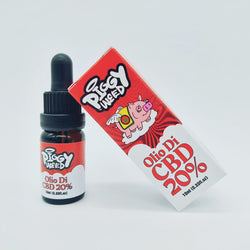The CBD, a non-psychoactive phytocannabinoid derived primarily from Cannabis sativa, is among the most studied natural substances among those studying psychology and neurology. Cannabis It is a plant known since ancient times for its medical properties and modern research is re-evaluating these potentialities with a view to increasingly helping people suffering from chronic conditions to contain the symptoms.
The are well known anxiolytic, anti-psychotic properties, anti-inflammatory, analgesic, antiepileptic, antiemetic and antitumor properties of CBD and cannabis in general; however, there is still much to discover about the possible uses of this extraordinary substance for the treatment of many psychological problems.
CBD: Effects on the Brain from a Chemical Point of View
The effects of cannabis on the brain are positive thanks to an interaction of this substance with the chemistry of our nervous system. In our body – it is rarely talked about – there is a endocannabinoid system, in medical language SEC. It is a lipid signaling system that serves to mediate and regulate a series of functions such as appetite, sleep, memory and even mood. Cannabinoids such as CBD come into contact with this system and modulate positively the activity.
The Effects of THC on the Brain are much more powerful than those of CBD but since this is a psychoactive substance (often used for recreational purposes) it could cause more discomfort than desired for certain medical conditions. Furthermore, unfortunately in many countries "complete" cannabis is still considered illegal. This is why CBD is so closely monitored by scientists: it has important functions in common with THC but reduces discomfort related to the hiring and the issue of legality is “skipped”.
When we drink a herbal tea with CBD, we smoke legal cannabis flowers or take hemp oil under the tongue we do an activating action of the endocannabinoid system stimulating its response. But beyond the simplest problems, such as mild anxiety or insomnia, for which CBD has been prescribed for years by doctors around the world, let's now discover the properties of this substance also on the neurological front.
Cannabis: Effects on the Brain from a Neurological Research Perspective
Since the 1980s, there have been many international studies that have been devoted to defining the Effects of CBD on the BrainAmong the leading researchers we can count Professor Joseph Alexandre Crippa of the University of Sao Paulo (Brazil) which for over 40 years has produced high quality studies on this substance and its neurological effects. Professor Crippa was among the first to discover the Anxiolytic effects of CBD but also to bring his work to the attention of the world antipsychotic virtues. It is thanks to research like this that more and more neuropsychiatrists around the world are prescribing cannabis to their patients.
A 1982 study was fundamental in putting CBD vs THC comparison in healthy volunteers. The THC molecule taken alone and in high doses could cause anxiety and psychotic symptoms, while THC combined with CBD showed a reduced incidence of these types of problems.From there scientists began to understand and appreciate The Protective Role of CBD for the Brain and its great importance for both consumers of “whole” cannabis and consumers of CBD only for medical purposes.
CBD effects on fear: an anti-anxiety molecule
A very interesting scientific research has analyzed the role of CBD as a regulator of the brain’s response to fearful stimuli. Volunteers underwent MRI scans while looking at images of “fearful” faces with and without CBD intake.
Cannabidiol was found to affect three parts of the brain, the anterior and posterior cingulate and the amygdala, helping to dampen the brain's response to fearful stimuli. From this and other similar research, the powerful anxiolytic property of CBD has been brought to scientific attention. This molecule, in fact, reduces neuronal excitation connected to present or feared fearful stimuli, significantly reducing anxiety.
CBD as an endocannabinoid tone enhancer
Several studies have shown that CBD inhibits the degradation of Anandamide (AEA), one of the main endocannabinoids produced by our body. In our body there is an enzyme called FAAH (from the English Fatty Acid Amide Hydrolase) which causes the degradation of anandamide and therefore decreases the activity of the endocannabinoid system. But CBD inhibits FAAH and this is why scientists say that CBD increases “endocannabinoid tone”.
What does this mean? Basically, when anandamide degrades it causes a “deactivation” of the endocannabinoid system, making people more prone to mood disorders, anxiety, etc. CBD, unlike many other substances such as THC, has an indirect but valuable action on the endocannabinoid system by increasing its tone, i.e. performance.
Practically when we take CBD we give our endocannabinoid system a “pampering” and help it work better.
It's enlightening the example of a Scottish woman, cited in some studies, who presented a genetic mutation of the FAAH enzyme: in her body the substance did not "work" as in other people. This lucky lady demonstrated aa particularly good mood and poor perception of pain, despite having undergone orthopedic surgery which must have been painful also due to the humidity of his homeland.
Who takes the CBD can somehow replicate the fortunate conditions of this lady 66 years old in excellent mental and physical shape.
CBD as a cure: debunking the myths
In this article, due to space constraints, we were unable to delve into all the positive properties of CBD on the brain, but we hope to have given an idea of how science considers research in this field to be valuable. Cannabidiol is an ancient medicine, but also in some ways the medicine of the future: despite being so natural, it can actually help alleviate physical and mental pain, combat anxiety and even have a neuroprotective function.
It is more than ever it is essential that politics lends a hand to science ceasing to erect ideological barriers against cannabis and reconsidering its important functions for the well-being of the population, especially since it is free from those harmful side effects which we often see in those who have to take “traditional” medicines for a long time.
The information contained in the Piggyweed blog is for informational purposes only and can be modified or removed at any time. In no case should it be considered as a diagnosis or prescription of treatment and should not in any way replace doctor-patient relationships or specialist visits. It is always recommended to consult your doctor and/or specialists regarding any indication reported. In case of doubts or questions about a treatment it is necessary to consult your doctor.





